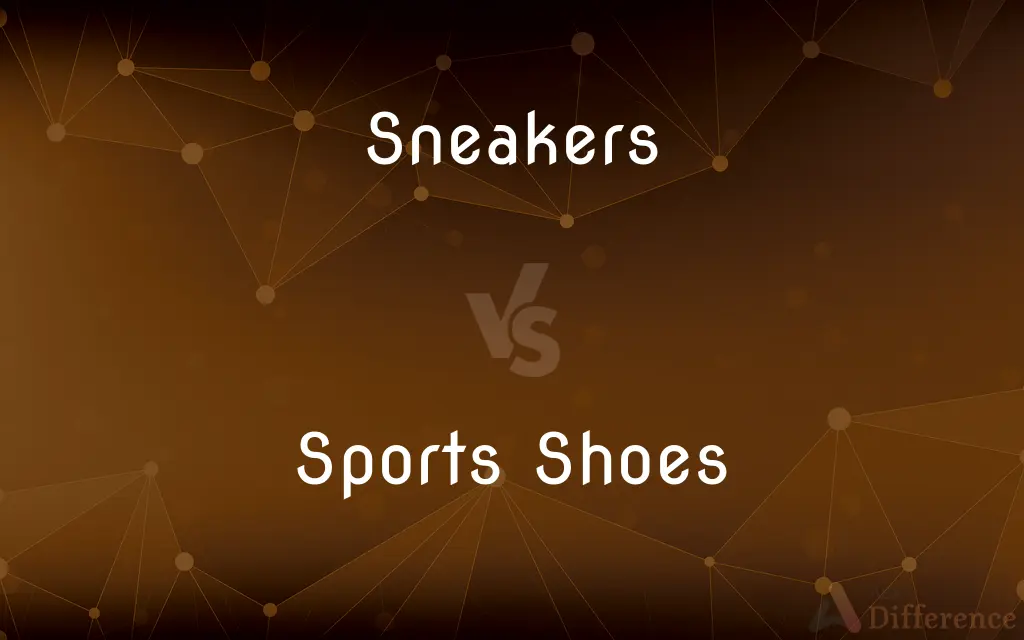Sneakers vs. Sports Shoes — What's the Difference?
By Tayyaba Rehman — Published on January 20, 2024
Sneakers are casual, comfortable shoes designed for everyday wear, while Sports Shoes are specifically designed for sports and physical activities.

Difference Between Sneakers and Sports Shoes
Table of Contents
ADVERTISEMENT
Key Differences
Sneakers, also known as trainers or athletic shoes, are designed primarily for comfort and daily casual wear. They are versatile and often fashion-oriented. Sports Shoes are designed specifically for sports and physical activities, focusing on performance, support, and durability required for specific sports.
While Sneakers may be used for light physical activities, they are generally not suitable for specialized sports activities. Sports Shoes, such as running shoes, soccer cleats, or basketball shoes, are engineered to provide enhanced support, traction, and protection in specific sports environments.
The design of Sneakers often emphasizes a balance of comfort and style, with diverse designs and materials catering to fashion trends. In contrast, Sports Shoes prioritize features like cushioning, stability, and specific outsole materials for athletic performance.
Sneakers are suitable for everyday activities, walking, and light exercise, appealing to a broad consumer base. Sports Shoes are targeted towards athletes and individuals engaging in particular sports, requiring features like spiked soles for track, cleats for soccer, or reinforced sides for basketball.
In terms of market and branding, Sneakers are marketed as lifestyle footwear with a wide range of styles and brands. Sports Shoes are often marketed by their specific athletic use, with endorsements from athletes and associations with sports events.
ADVERTISEMENT
Comparison Chart
Primary Use
Casual wear, everyday comfort
Specific sports and physical activities
Design Focus
Comfort and style
Performance and support for specific sports
Suitability
Everyday activities, walking, light exercise
Rigorous physical activities, professional sports
Market Appeal
Broad consumer base
Athletes and sports enthusiasts
Branding and Marketing
Marketed as lifestyle footwear
Marketed for specific sports and athletic performance
Compare with Definitions
Sneakers
Casual, comfortable footwear for everyday use.
I wear my sneakers when I go shopping.
Sports Shoes
Focus on performance, support, and durability.
These sports shoes provide great support during my basketball games.
Sneakers
Often designed with a focus on style and fashion.
My new sneakers are both trendy and comfortable.
Sports Shoes
Often include specialized features like spikes or cleats.
My soccer sports shoes have cleats for better traction on the field.
Sneakers
Versatile and popular among all age groups.
Sneakers are my go-to shoes for both comfort and style.
Sports Shoes
Marketed with endorsements from athletes.
These sports shoes are endorsed by a famous tennis player.
Sneakers
Suitable for light physical activities.
These sneakers are perfect for a casual walk in the park.
Sports Shoes
Used by athletes for enhanced athletic performance.
Professional runners often choose sports shoes for optimal performance.
Sneakers
Made with a variety of materials and designs.
My canvas sneakers go well with almost any outfit.
Sports Shoes
Designed for specific sports and activities.
I bought these sports shoes for my marathon training.
Sneakers
A shoe designed for outdoor activity, usually made of canvas with a rubber sole. Also called tennis shoe.
Sneakers
Plural of sneaker
Common Curiosities
Are sneakers and sports shoes the same?
No, sneakers are for casual use, while sports shoes are for specific sports and physical activities.
Can I wear sneakers for running?
For light running, sneakers can be suitable, but for long-distance or professional running, specific running shoes are recommended.
Why do sports shoes have different designs?
Sports shoes are designed with specific features to enhance performance and provide support in various sports.
Are sports shoes more expensive than sneakers?
Depending on the brand and technology, sports shoes can be more expensive due to their specialized features.
Do sports shoes offer more support than sneakers?
Yes, sports shoes offer more support and are tailored to the demands of specific physical activities.
Can sneakers be used for gym workouts?
For light workouts, sneakers can be suitable, but for intensive workouts, gym-specific shoes are better.
Can I use sports shoes for daily wear?
While you can, sports shoes are specifically designed for physical activities and may not be as suitable for casual daily wear.
Are there eco-friendly sneakers and sports shoes?
Yes, many brands now offer eco-friendly options made with sustainable materials.
What are sneakers best used for?
Sneakers are best used for casual wear, everyday comfort, and light physical activities.
Are sneakers suitable for all sports?
Sneakers are not suitable for specialized sports that require specific features like spikes or extra cushioning.
Do all sports shoes have laces?
Most have laces, but some, like certain running shoes, may have alternative closure systems for a snug fit.
How often should I replace my sports shoes?
It depends on usage, but generally, sports shoes should be replaced every 300 to 500 miles of use or if they show significant wear.
Can I wear sneakers for hiking?
For light hiking, some sneakers might be suitable, but for challenging terrains, hiking-specific shoes are advised.
Do I need different sports shoes for different sports?
Yes, different sports have different requirements, so it's best to use sports-specific shoes for optimal performance and safety.
Why are there so many types of sports shoes?
Different types cater to the specific needs and surfaces of various sports.
Share Your Discovery

Previous Comparison
Toyota JZX90 vs. Toyota JZX100
Next Comparison
Radisson vs. Radisson BluAuthor Spotlight
Written by
Tayyaba RehmanTayyaba Rehman is a distinguished writer, currently serving as a primary contributor to askdifference.com. As a researcher in semantics and etymology, Tayyaba's passion for the complexity of languages and their distinctions has found a perfect home on the platform. Tayyaba delves into the intricacies of language, distinguishing between commonly confused words and phrases, thereby providing clarity for readers worldwide.
















































